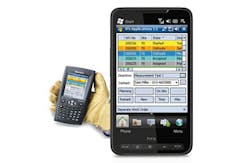About 70% of maintenance personnel have at least some mobile access to maintenance data, according to a just-released survey of more than 200 executives in industrial companies. But only a minority is doing work in enterprise software from a mobile device.
Without direct access to the enterprise system, it’s said the productivity gains that are supposed to follow from computer-based coordination of maintenance work are less than would otherwise be possible. An enterprise system’s "native" applications should offer function, use and security advantages. The survey authors also believe that cloud-mediation of native applications offers distinct advantages.
The study on enterprise asset management (EAM) was conducted by enterprise-software vendor IFS North America. The acronym EAM is today fairly well known as a conceptual euphemism for the maintenance function, implying its key role in keeping capital equipment productive and its importance to enterprise profitability.
Only 34% of respondents said maintenance personnel are "working" via mobile device. The study concludes that the way a mobile app is connected to its back-office application is key in determining how well EAM mobility works.
Surveys were completed by more than 200 executives with industrial companies that had more than $50 million in revenues. The purpose was learning to what extent enterprise data is accessible and how it is accessed by those doing maintenance work.
Unfortunately, those having "some" mobile access to enterprise data, says Chuck Rathmann, a marketing communications analyst with IFS and one of the authors of the report, "are typically reliant on the company’s virtual private network, or VPN." The drawback of that is applications accessed through VPN aren’t optimized for smartphone screen formats and are usually dependent on an uninterrupted connection, perhaps not available at a remote site; not to mention additional license costs.
Mobility access has been achieved, according to the survey respondents, as follows:
- Native applications from software vendor – 22%
- Home-grown applications – 19%
- Third-party tool, e.g., Cisco VPN – 48%
- Direct integration at API or database – 26%
- Cloud-based intermediary – 21%
- User interface for touchscreen/tablets – 15%
About 30% of users of both enterprise resources planning (ERP) and EAM reported "fair-to-middling" levels of mobile access to enterprise data, while 26% and 22%, respectively, said it was good or excellent.
Because of these challenges, the enterprise software vendor believes, companies in future will tend to use mobile applications from their enterprise vendor including:
- Native apps of a mobile device operating system like Android or iOS
- Interfaces for mobile use on tablets and touchscreens
- Native apps for hand-held, ruggedized devices
Finally, besides there being no need for a VPN with cloud-mediated native applications, it’s much easier for users to access the enterprise with their privately-owned devices, Rathmann says. So-called self-provisioning lets users download the applications they need from marketplaces with minimal IT assistance or overview.


